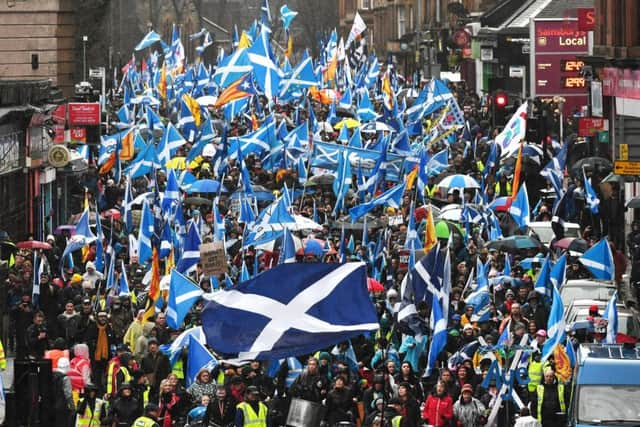Scottish independence campaigners should ‘stop marching and start thinking’, says SNP veteran
The Prime Minister wrote to Nicola Sturgeon, inset, to insist the result of the 2014 vote must be respected and that his government “would continue to uphold the democratic decision of the Scottish people”.
The correspondence was sent three days after the latest All Under One Banner (AUOB) event, which saw tens of thousands of people march through Glasgow in support of a second referendum.
Advertisement
Hide AdAdvertisement
Hide AdIn an interview with Scotland on Sunday, Sillars – a veteran of the independence movement – said there was now no realistic chance of an indyref2 taking place this year, and called for the SNP to instead focus its energies on scrutinising whatever trade deal was presented by the UK government ahead of Brexit.


The former MP said it was “not possible” to present a coherent economic argument for independence when the terms of the UK’s departure from the EU were still unknown.
Sillars, who famously won the 1988 Govan by-election for the SNP, said the Yes campaign still had much work to do before it could mount a second campaign with a strong prospect of victory.
“It was – and remains – sheer madness to demand a referendum this year,” he said. “We have hardly moved the numbers in favour of independence.
“And, until Brexit is done by the end of this year and we know the full details of any trade deal, it’s impossible for the independence movement to construct a policy in relation to England, which is our largest market by far.
“Until Brexit is deemed to be done, and we can examine it in detail to see how it works in practice, we cannot devise a policy that will convince people to vote for independence in a substantial majority.”
He continued: “The independence movement, and in particular the MPs at Westminster, should stop shouting for an independence referendum this year and instead be submitting the details of the free trade negotiations to forensic examination.”
Sillars has previously criticised the SNP leadership over what he described as the party’s “infatuation” with the EU.
Advertisement
Hide AdAdvertisement
Hide AdHe put himself at odds with other senior Nationalist figures in 2016 by actively campaigning for a Leave vote ahead of the Brexit referendum, arguing that Brussels was a “barrier” to independence.
In the wake of Mr Johnson’s letter, some in the SNP have argued Sturgeon must now explore possible “plan Bs” to securing independence.
The First Minister has made it clear she views the process laid down by the 2012 Edinburgh Agreement, which paved the way for the referendum two years later, as the “gold standard”.
But Sillars said: “None of the plan Bs I have heard of are credible.
“What the independence movement must do now is stop marching and start thinking. They must realise we have quite a way to go.
“We have to build up a level of support for independence that cannot be defeated and that is some time away. Patience is required.”
Former Holyrood justice secretary Kenny MacAskill, who recently returned to frontline politics as the new SNP MP for East Lothian, last week called for a “coming together” of parliamentarians and others around the issue of “Scotland’s right to decide its own future”.
He said “time is of the essence” if a new constitutional convention was to be established to build support for a second independence referendum.
Advertisement
Hide AdAdvertisement
Hide AdThat position was backed today by Christopher McEleny, an SNP councillor on Inverclyde Council who previously called for other options to a section 30 order to be explored.
“I think the proposal for a constitutional convention must be taken very seriously,” he said.
“As much as everyone agrees Boris Johnson’s position is undemocratic, I don’t want to be sitting in five or ten years’ time making the same argument that we must have a choice.
“I think we need a strategy in place so we can put political pressure on Boris Johnson. Hoping or wishing that he agrees to a section 30 order is certainly not going to be good enough.”